[2007] 1 SLR(R) 629 - Singapore Law
[2007] 1 SLR(R) 629 - Singapore Law
[2007] 1 SLR(R) 629 - Singapore Law
You also want an ePaper? Increase the reach of your titles
YUMPU automatically turns print PDFs into web optimized ePapers that Google loves.
650 SINGAPORE LAW REPORTS (REISSUE) [<strong>2007</strong>] 1 <strong>SLR</strong>(R)<br />
out in the Second Schedule as it has for the purpose of and in relation<br />
to an action or matter in the court: … [emphasis added]<br />
The phrase “a reference” in s 27(1) of the AA means a reference to the<br />
arbitrator under the AA. No ambiguity arises from the use of that phrase in<br />
s 27(1) of the AA. However, in the context of the IAA, the only reference<br />
that is relevant for the purpose of the IAA would be a reference to the<br />
arbitral tribunal under Pt II of the IAA. Pursuing this line of reasoning, it<br />
would therefore be natural for the Committee to use the phrase “an<br />
arbitration to which Part II applies” (“the replacement phrase”) in s 12(7) as<br />
a substitute for and to equate it with the original phrase “a reference” in<br />
s 27(1) of the AA, for the purpose of giving concurrent powers to the court.<br />
In our view, this is a reasonable and acceptable explanation for the meaning<br />
of the replacement phrase. That this was the intention of the Committee in<br />
using the replacement phrase is also consistent with the new clause (6)<br />
(sub-s (7)) being placed in a provision, viz, s 12, that deals exclusively with<br />
the powers of arbitral tribunals conducting international arbitrations in<br />
<strong>Singapore</strong>. In our view, the placement of sub-s (7) in s 12 of the IAA raises a<br />
legitimate question why, if sub-s (7) was not intended to apply only to<br />
arbitral tribunals, it was not enacted as an independent provision to avoid<br />
any ambiguity that might arise as to its intent. Again, in our view, this<br />
argument, by itself, may not be a sufficient answer to the plain meaning of<br />
s 12(7).<br />
Argument from placement<br />
44 Prakash J gave considerable weight to the placement of s 12(7) as an<br />
indication of Parliament’s intention for it not to apply to foreign<br />
arbitrations. As ss 12(1) to 12(6) deal only with the powers of arbitral<br />
tribunals under Pt II of the Act, it would be incongruous for s 12(7) to<br />
travel outside the limits of the preceding subsections. In her view,<br />
construing s 12(7) to give the court concurrent powers would go far beyond<br />
its stated purpose of reinforcing the procedural orders given by arbitral<br />
tribunals under s 12(1). In our view, this is a reasonable conclusion in the<br />
light of one other consideration that Prakash J had already stated, viz, in her<br />
own words ([1] supra at [49]):<br />
If Parliament had intended to effect such a far-reaching change in the<br />
law as would allow our courts to make orders to assist foreign<br />
arbitrations notwithstanding that they would still be powerless to aid<br />
foreign court proceedings, the legislation would have been clearly<br />
worded to effect such a drastic change and it would not be necessary to<br />
imply it from the use of the words “an arbitration to which this Part<br />
applies” or from the fact that Art 9 of the Model <strong>Law</strong> itself envisages<br />
that courts may make such orders. [emphasis added]<br />
In other words, she considered it most unlikely, in the absence of clear<br />
words, that Parliament would have given the courts power to assist foreign<br />
arbitrations when Parliament had yet to give the court power to assist


![[2007] 1 SLR(R) 629 - Singapore Law](https://img.yumpu.com/7082457/22/500x640/2007-1-slrr-629-singapore-law.jpg)
![[2011] 1 SLR 727 - Singapore Law](https://img.yumpu.com/51140774/1/166x260/2011-1-slr-727-singapore-law.jpg?quality=85)
![[1983-1984] SLR(R) 447 - Artic Builders & Co - Singapore Law](https://img.yumpu.com/50909204/1/164x260/1983-1984-slrr-447-artic-builders-co-singapore-law.jpg?quality=85)
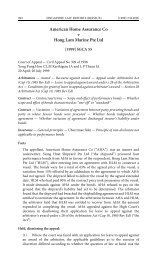
![[1996] 2 SLR(R) 292 - Lim Eng Hock Peter v ... - Singapore Law](https://img.yumpu.com/47482222/1/164x260/1996-2-slrr-292-lim-eng-hock-peter-v-singapore-law.jpg?quality=85)
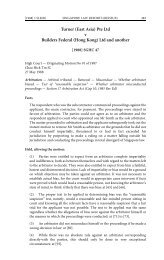
![[2006] 1 SLR(R) 197 - PT Asuransi Jasa Indonesia - Singapore Law](https://img.yumpu.com/46425352/1/164x260/2006-1-slrr-197-pt-asuransi-jasa-indonesia-singapore-law.jpg?quality=85)
![[1985-1986] SLR(R) 503 - Woh Hup (Pte) - Singapore Law](https://img.yumpu.com/45676364/1/164x260/1985-1986-slrr-503-woh-hup-pte-singapore-law.jpg?quality=85)

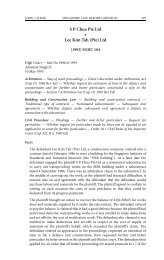
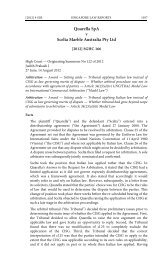
![[2010] 2 SLR 821 - Singapore Law](https://img.yumpu.com/43145563/1/166x260/2010-2-slr-821-singapore-law.jpg?quality=85)
![[2007] 1 SLR(R) 597 - PT Asuransi Jasa Indonesia - Singapore Law](https://img.yumpu.com/42983489/1/164x260/2007-1-slrr-597-pt-asuransi-jasa-indonesia-singapore-law.jpg?quality=85)
![[1989] 1 SLR(R) 433 - Singapore Law](https://img.yumpu.com/42649524/1/164x260/1989-1-slrr-433-singapore-law.jpg?quality=85)
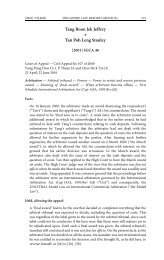
![[1997] 3 SLR(R) 360 - Singapore Law](https://img.yumpu.com/42287507/1/164x260/1997-3-slrr-360-singapore-law.jpg?quality=85)